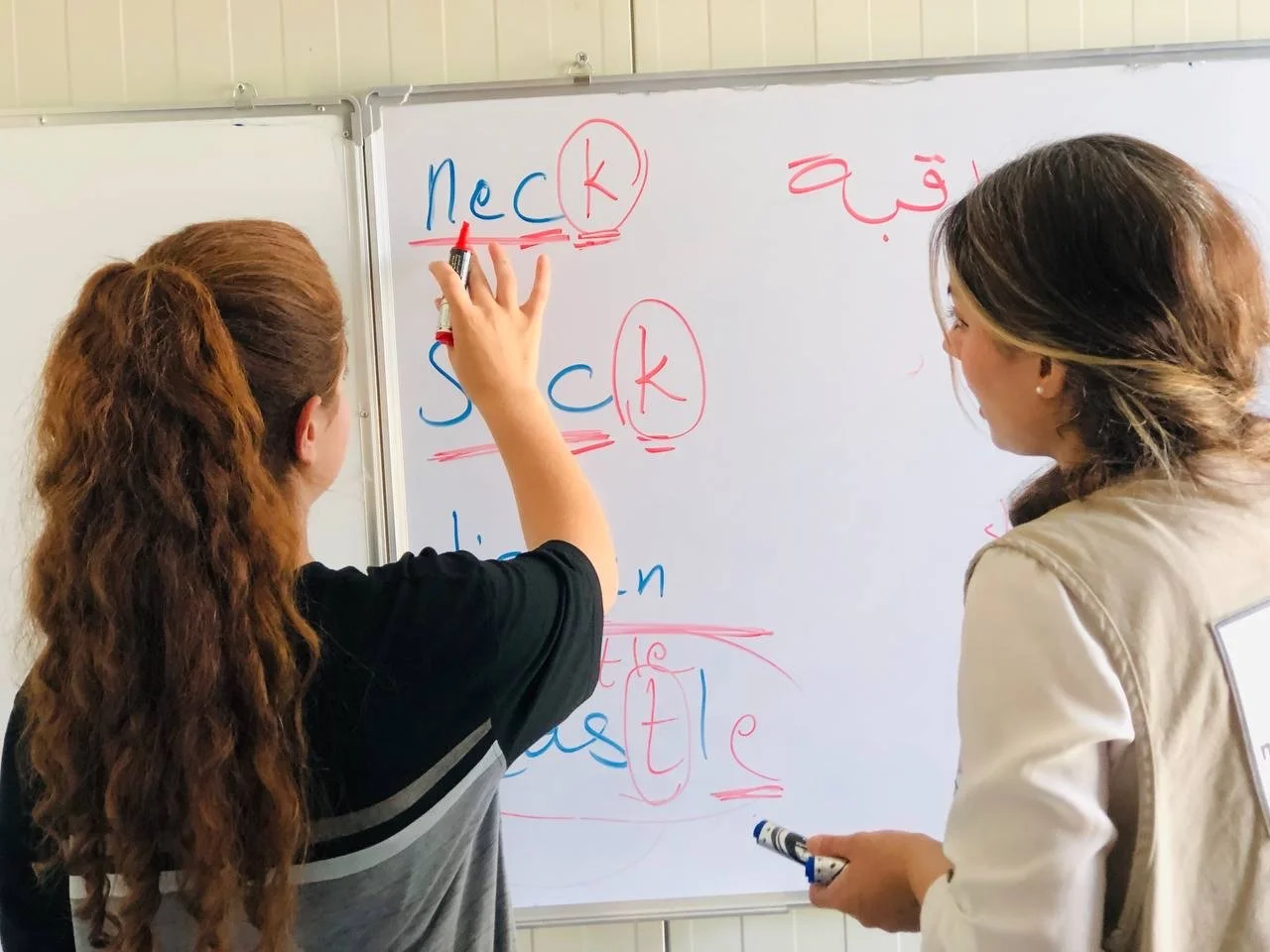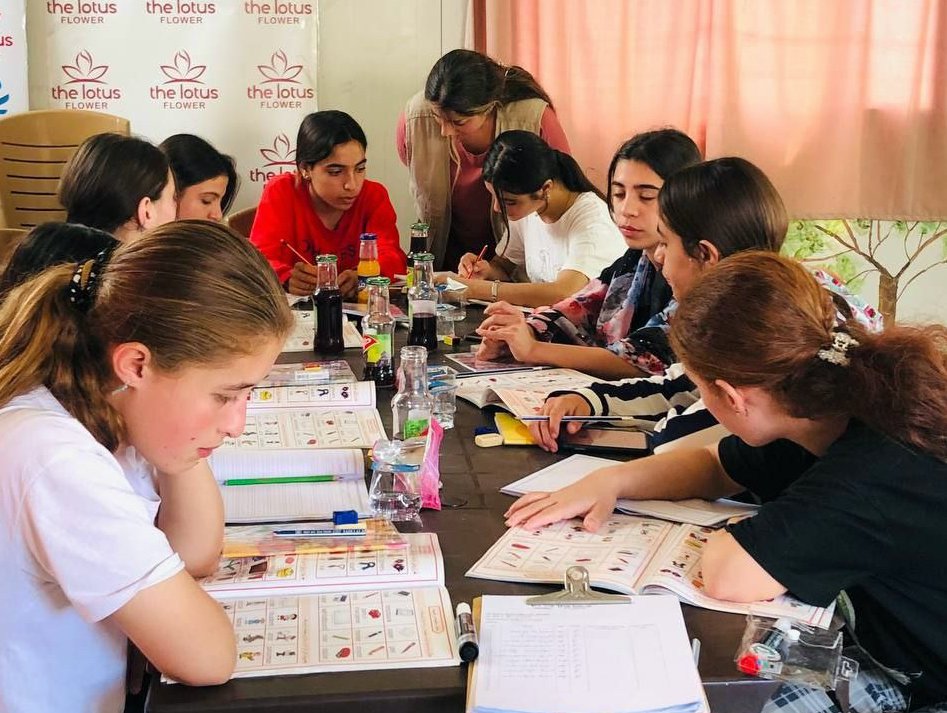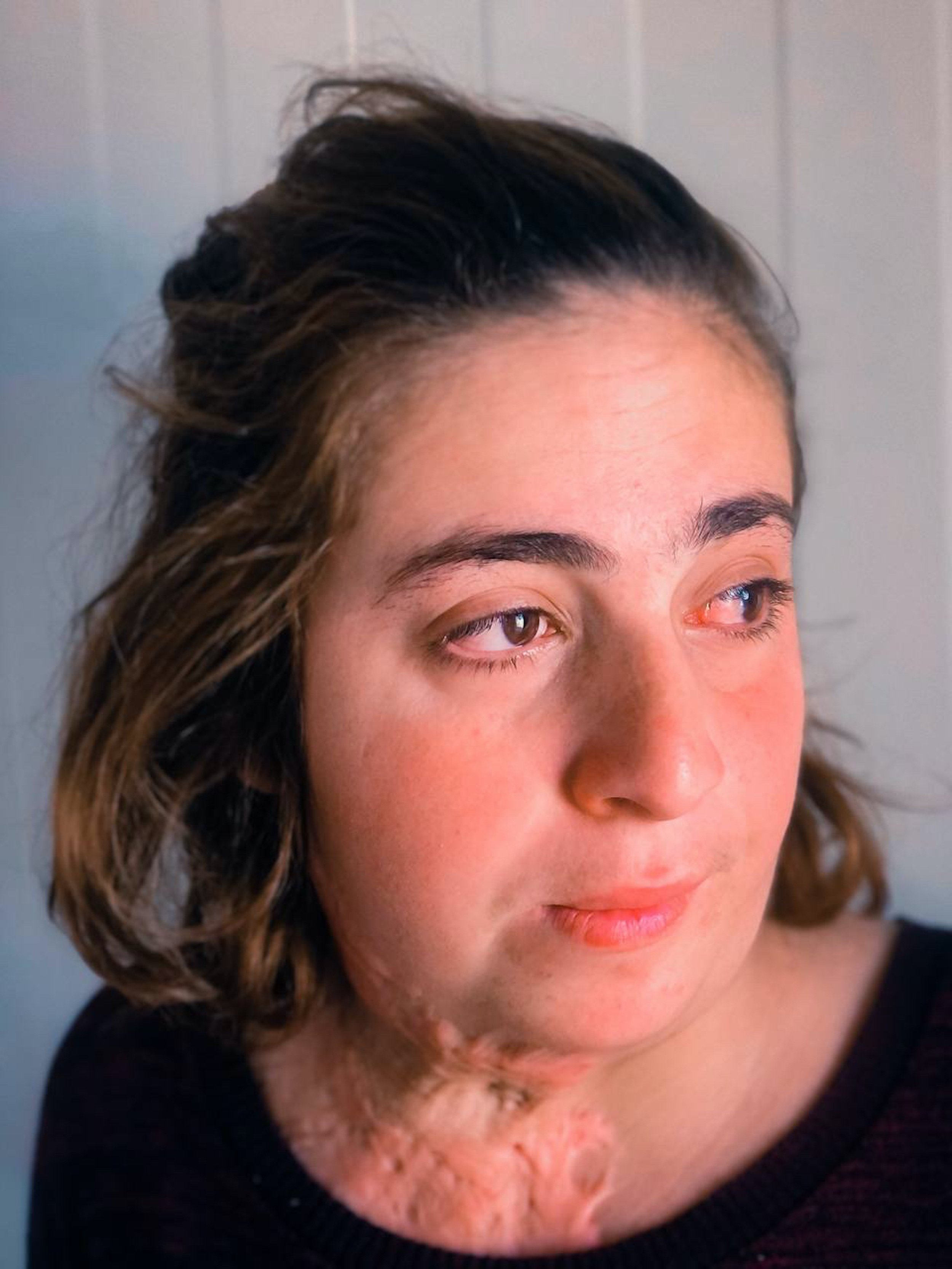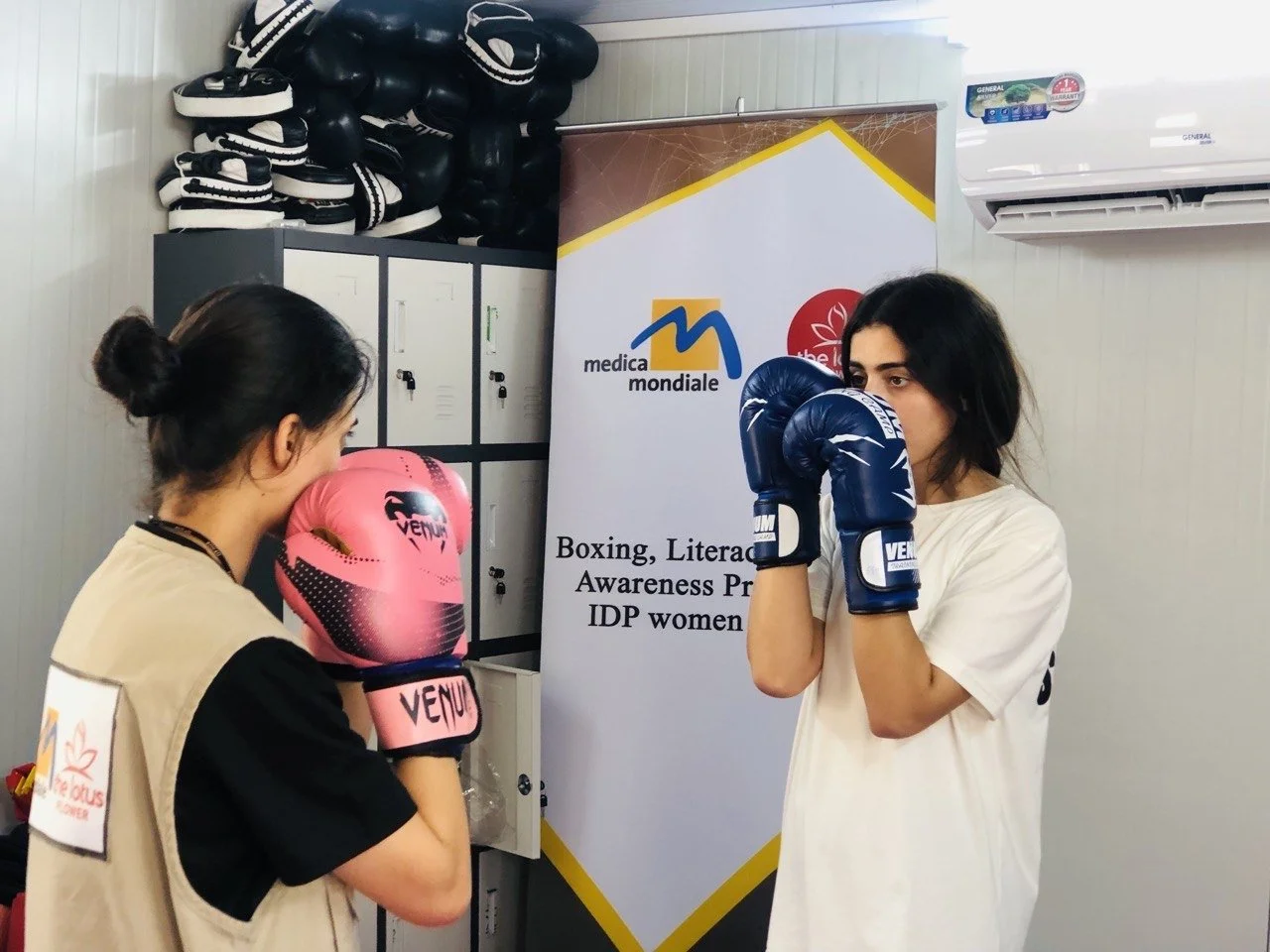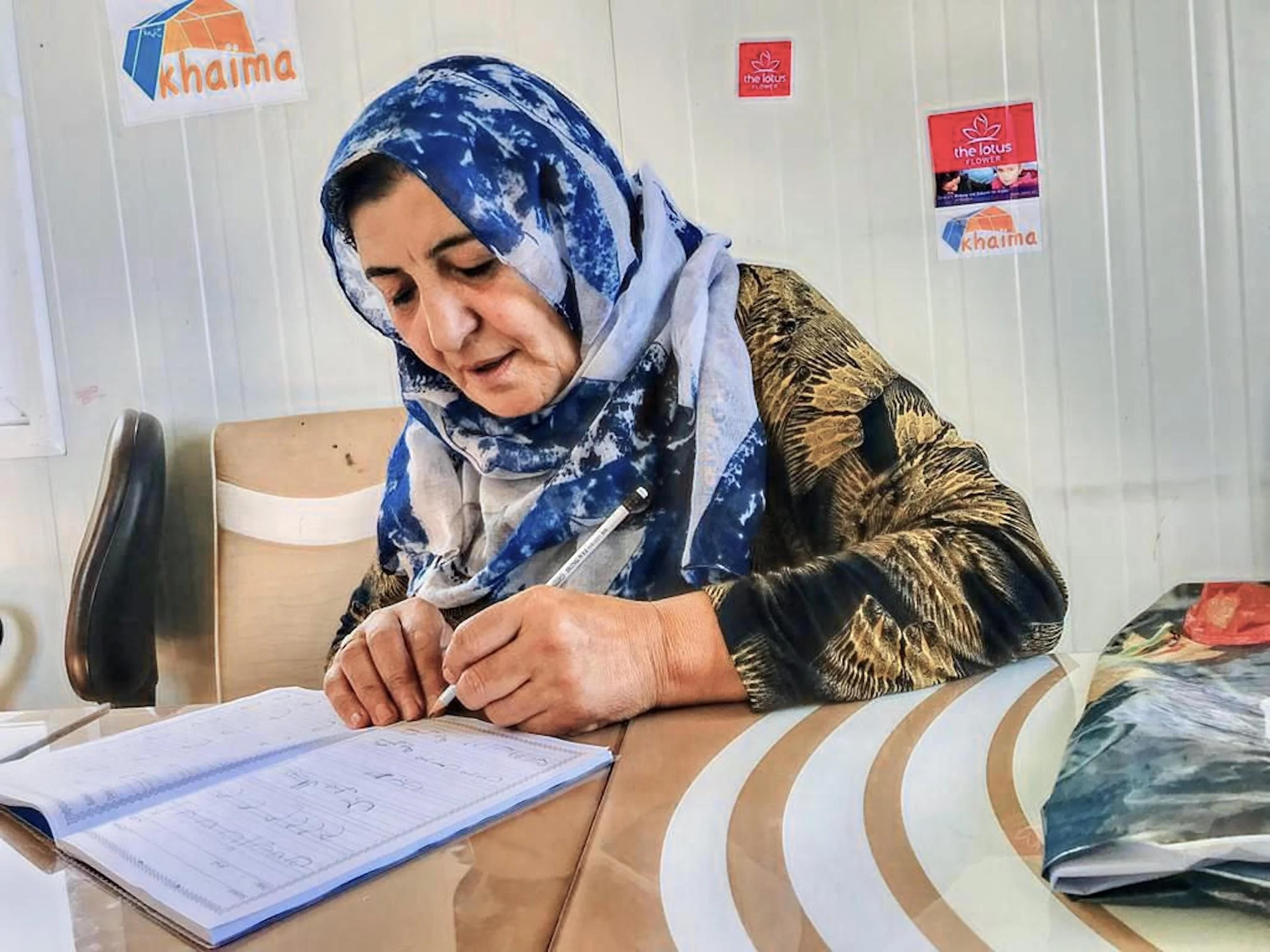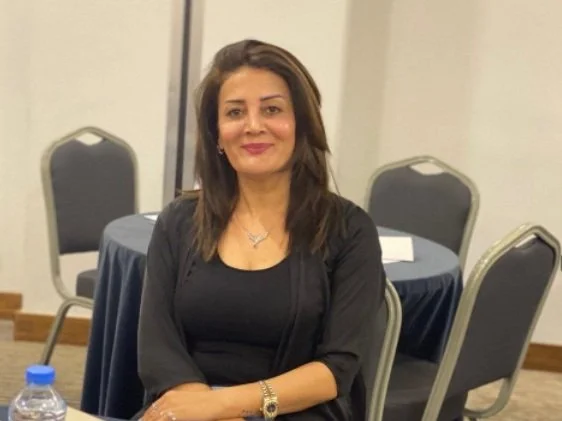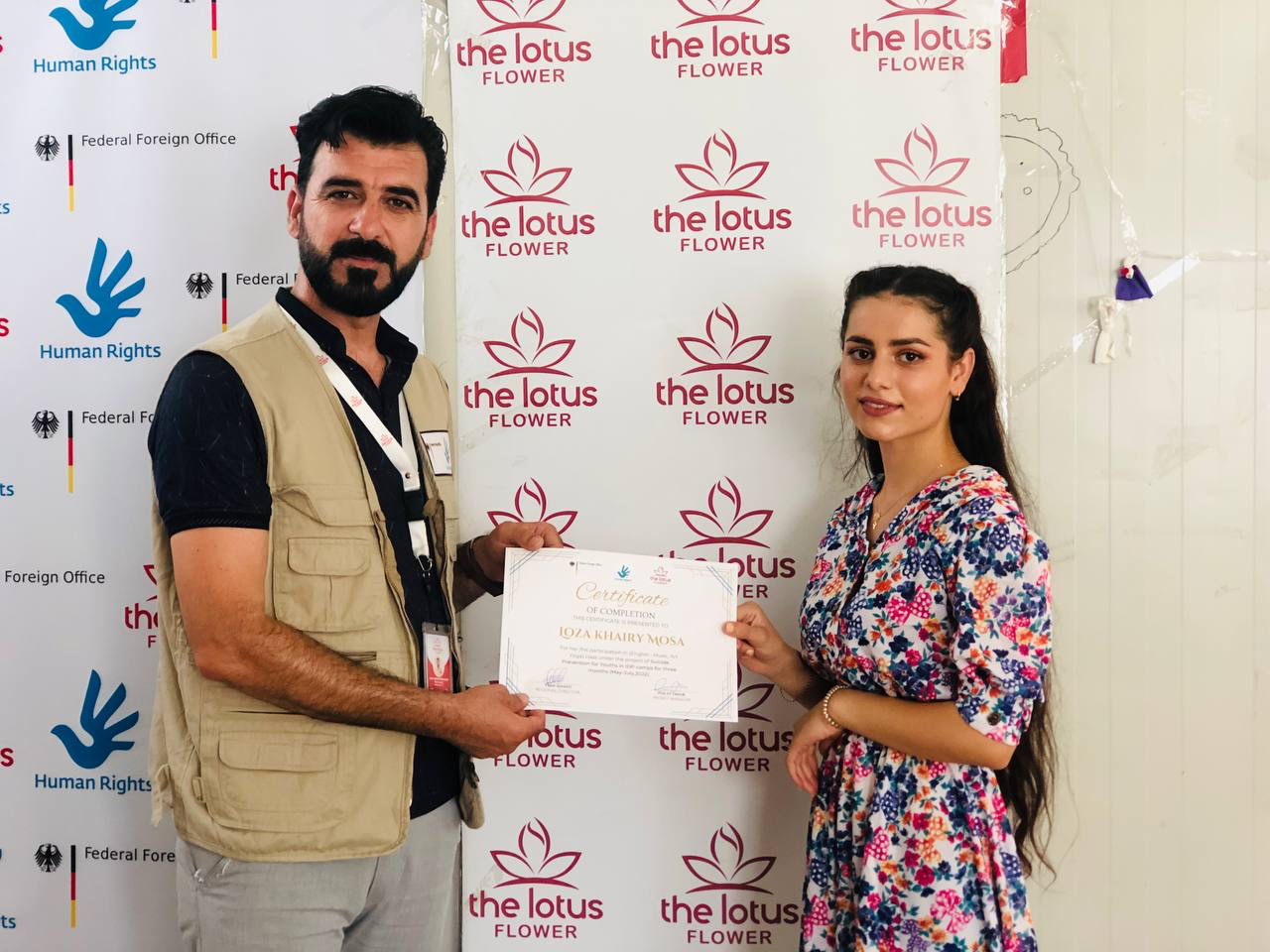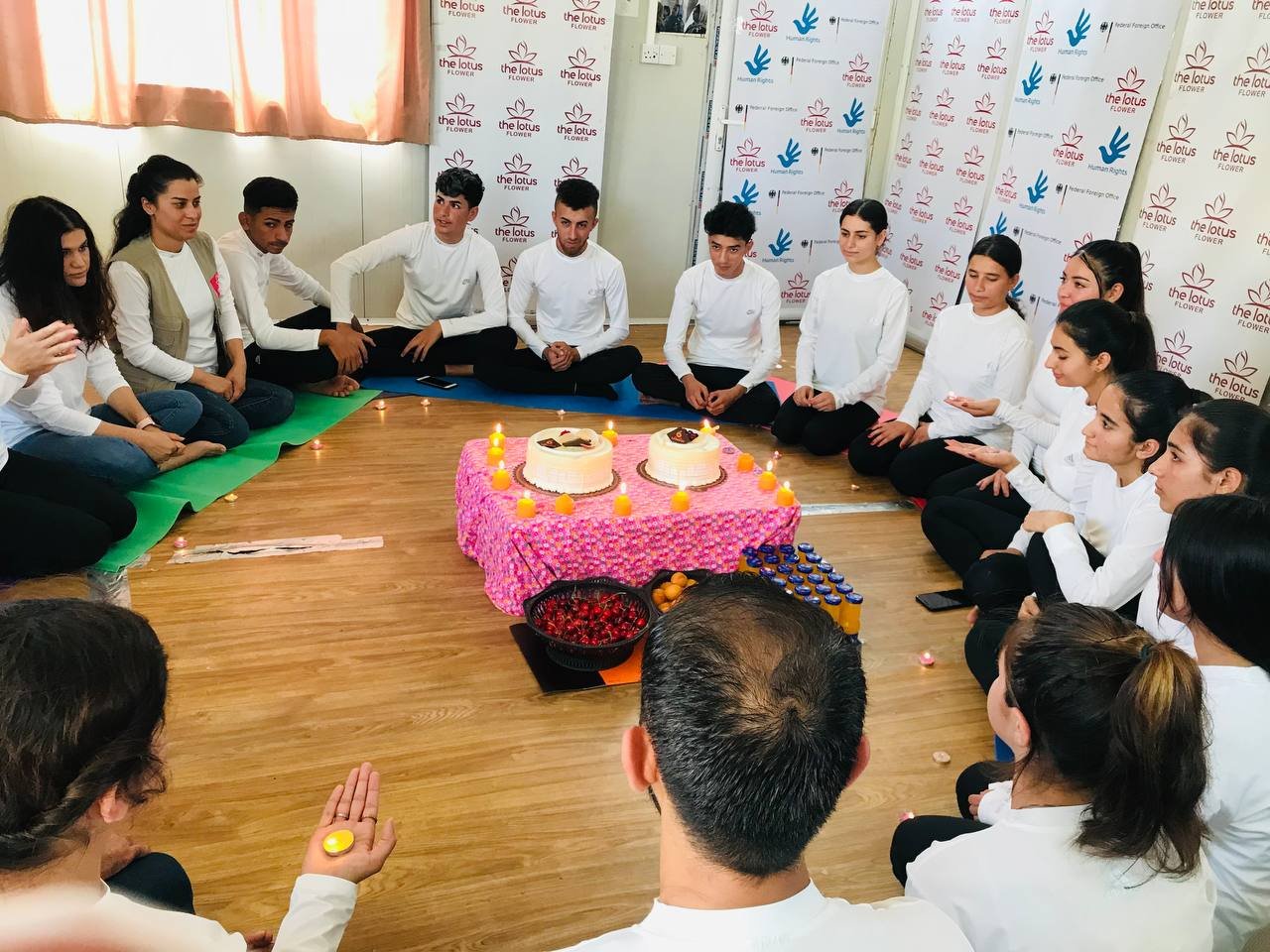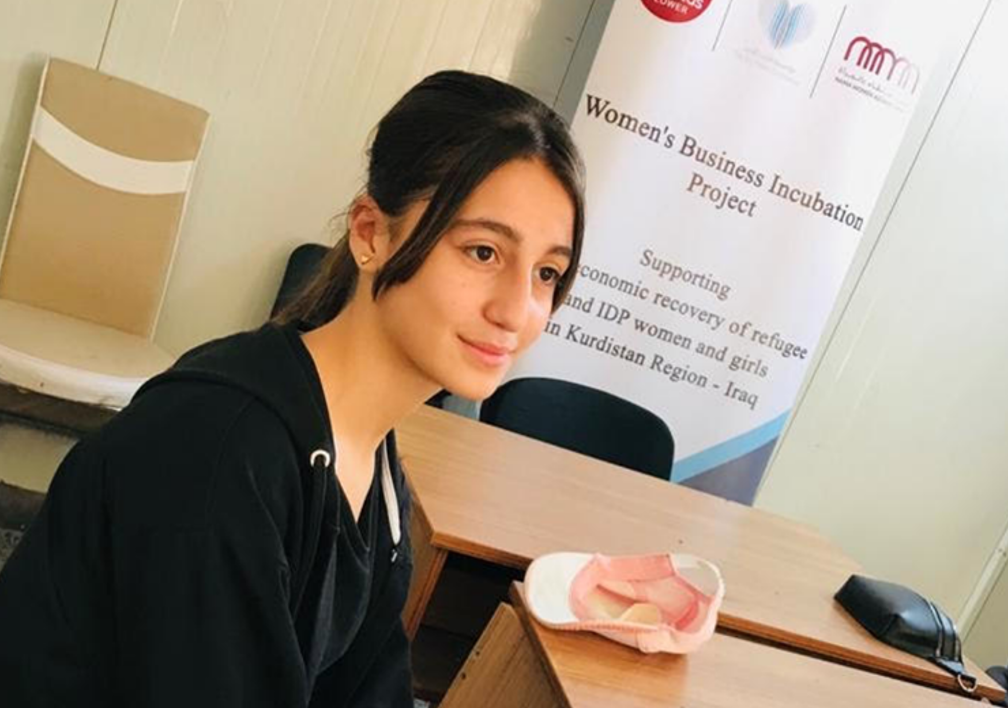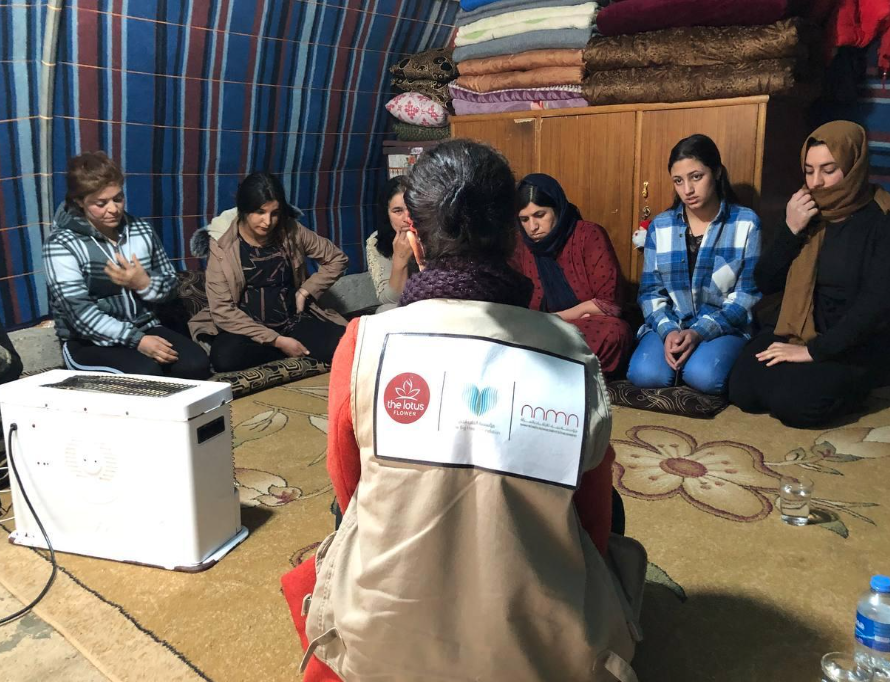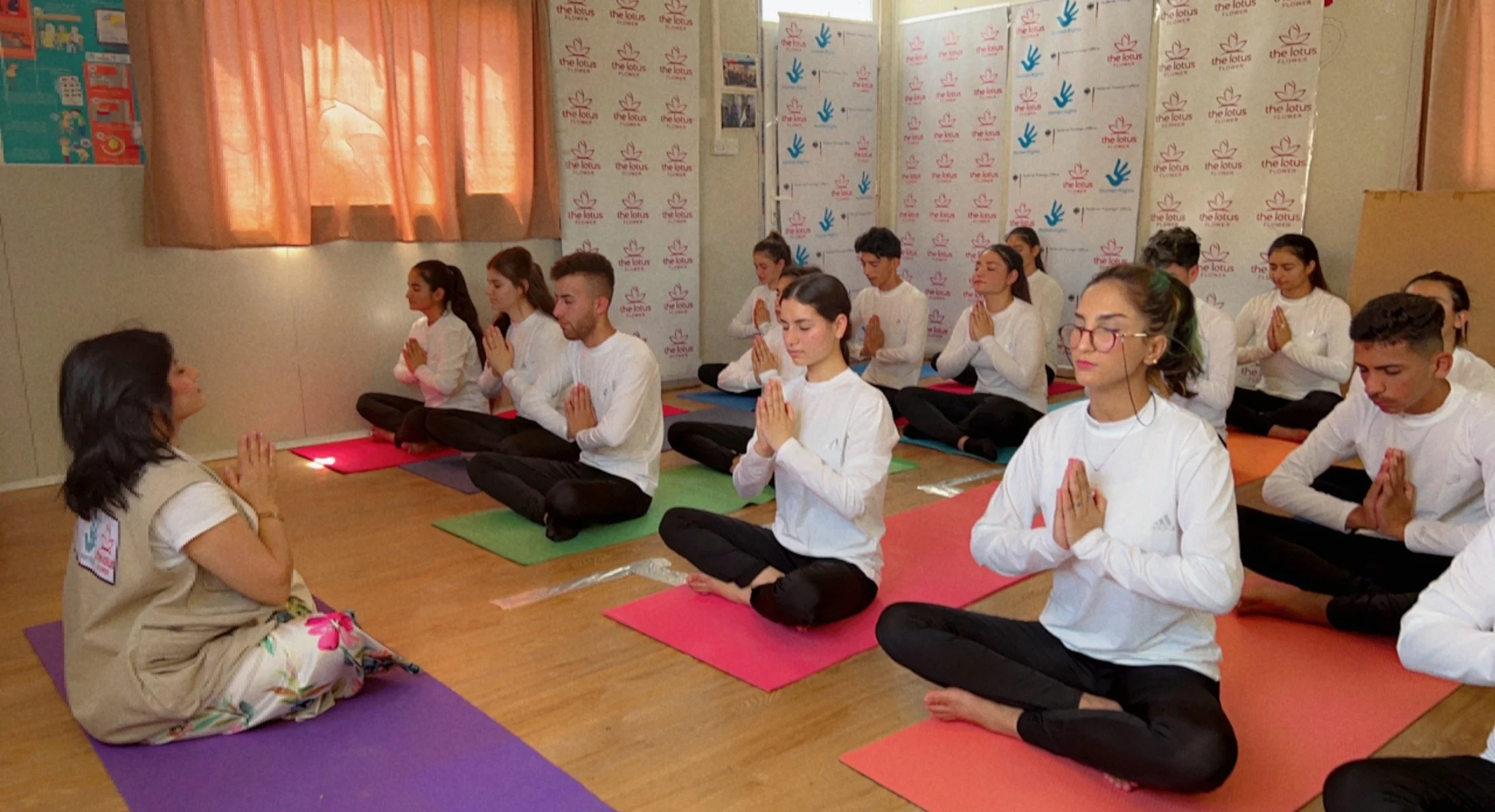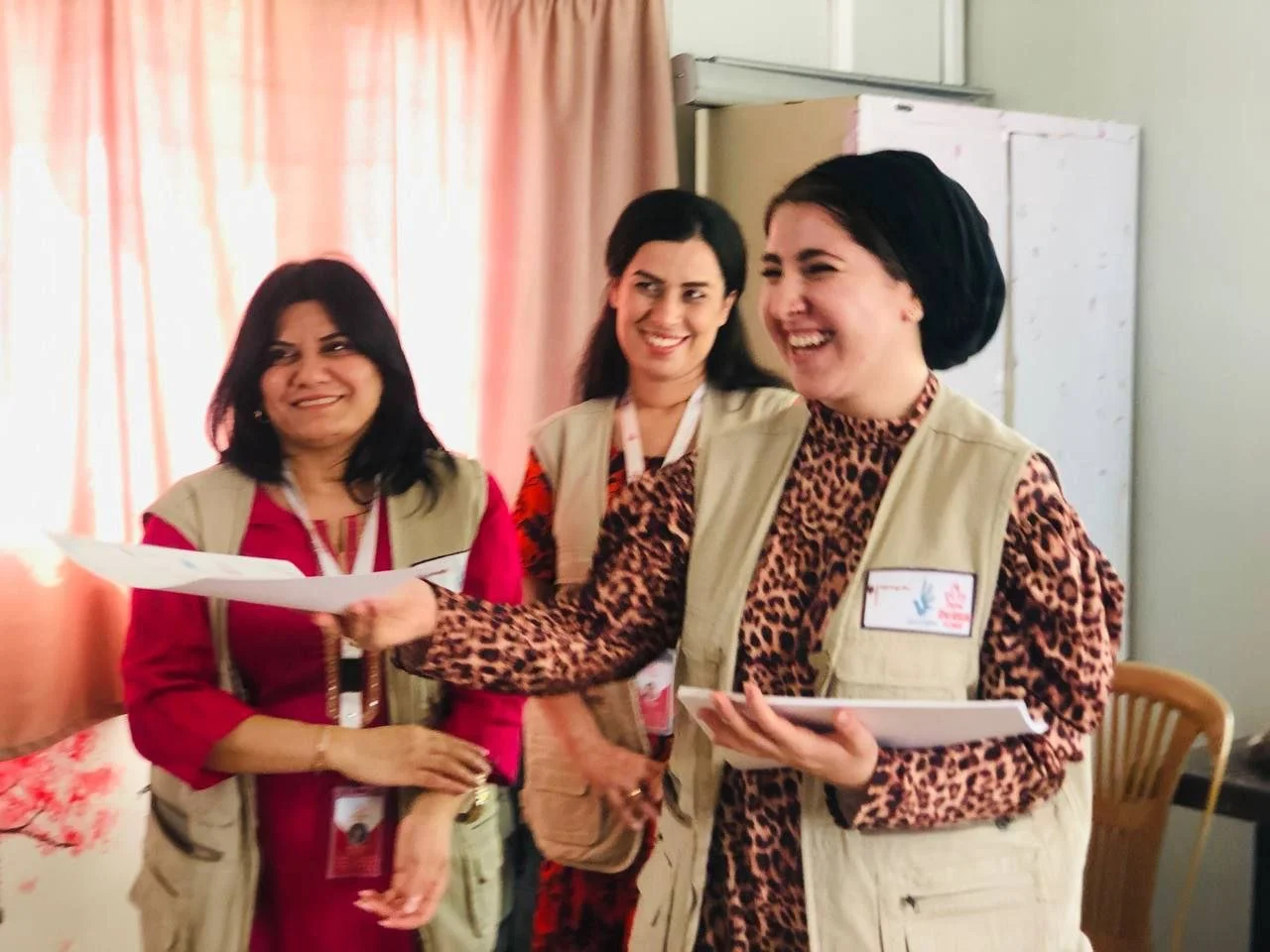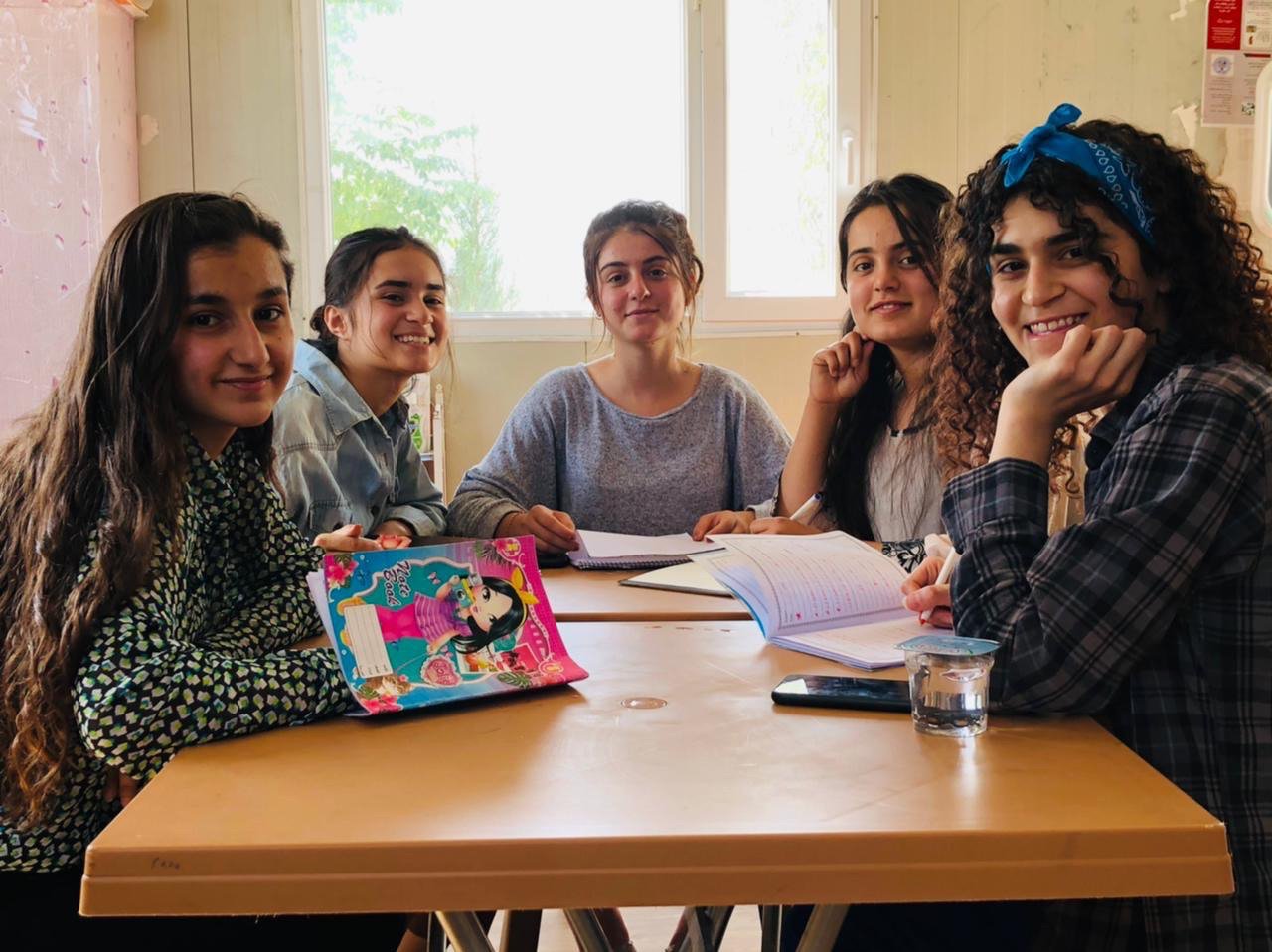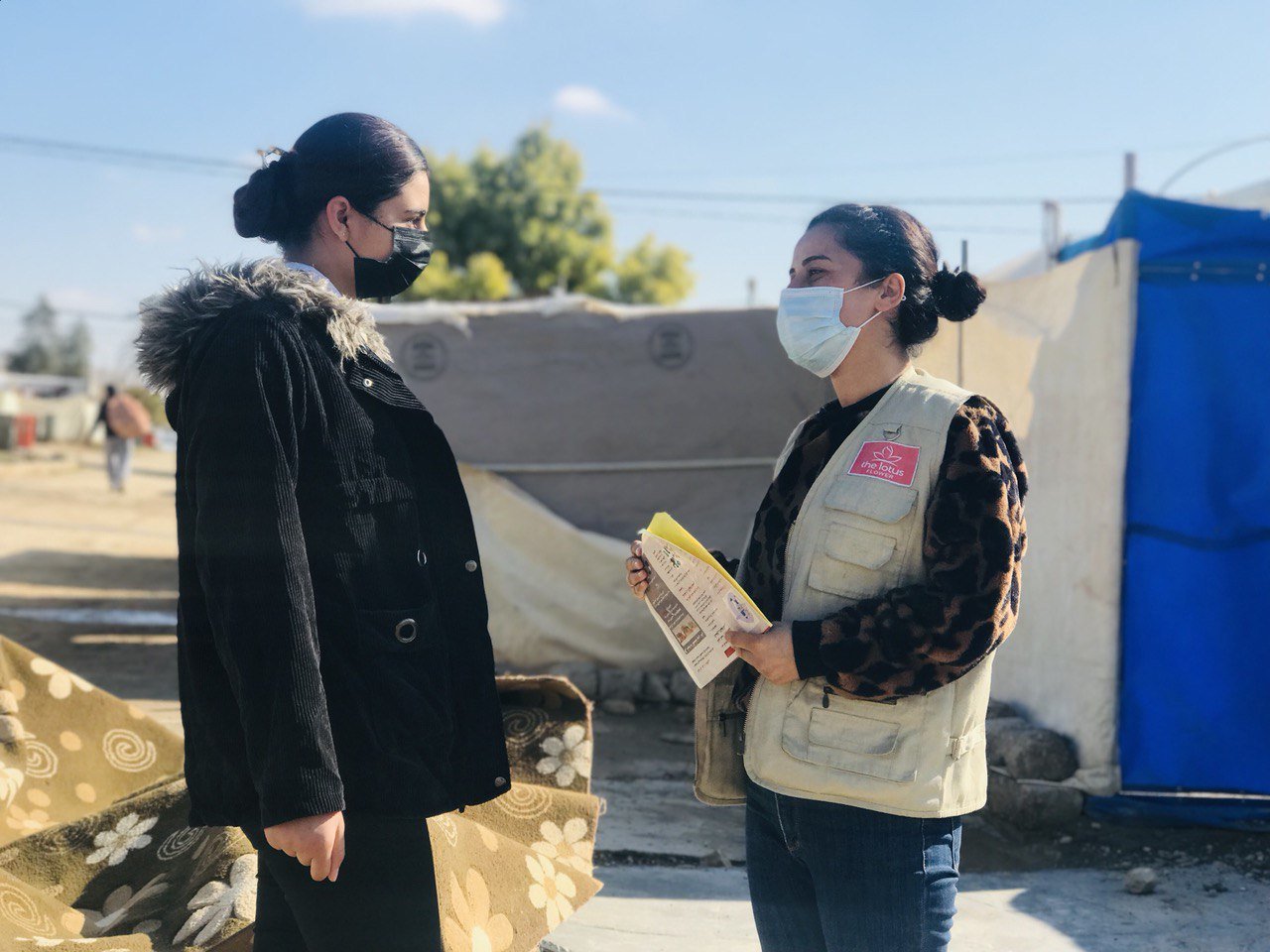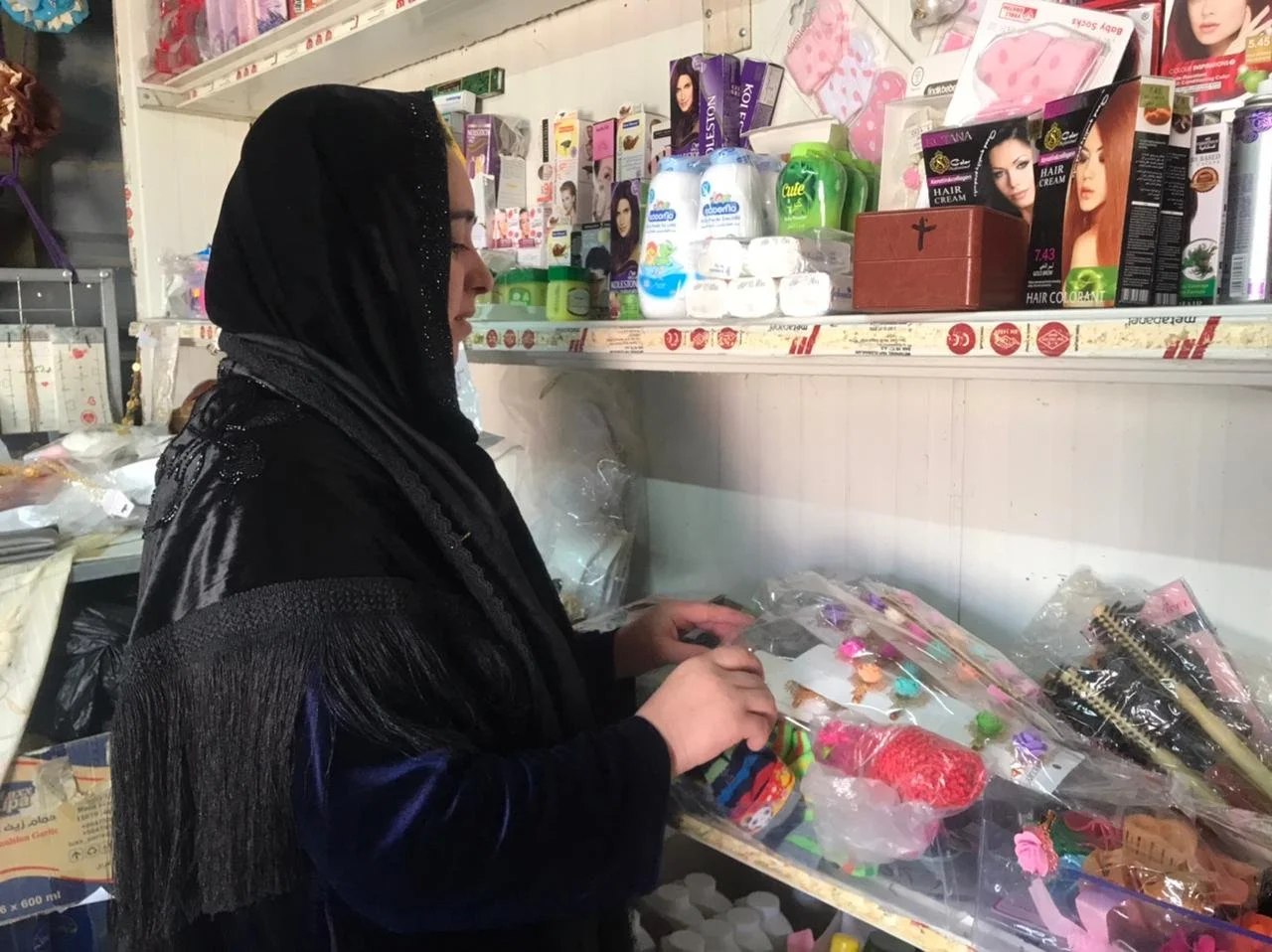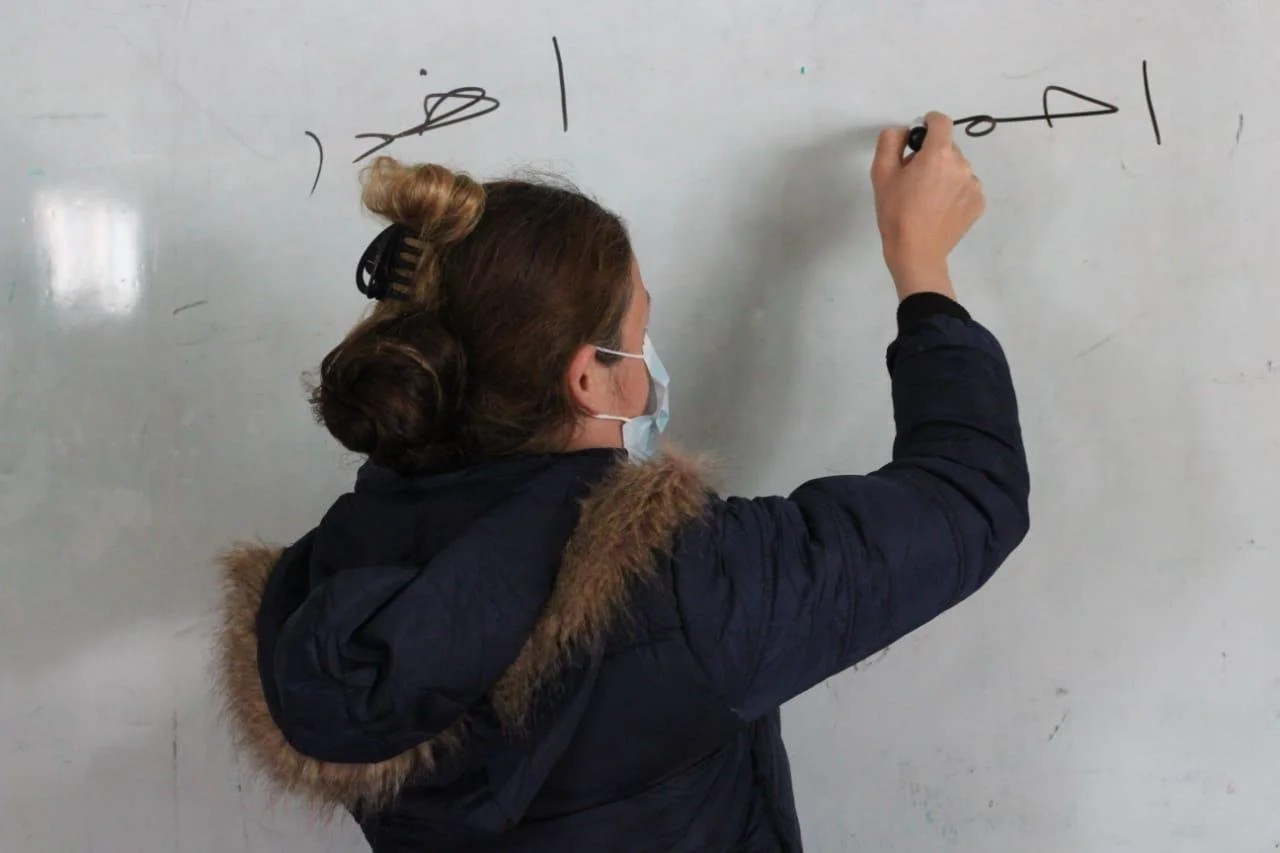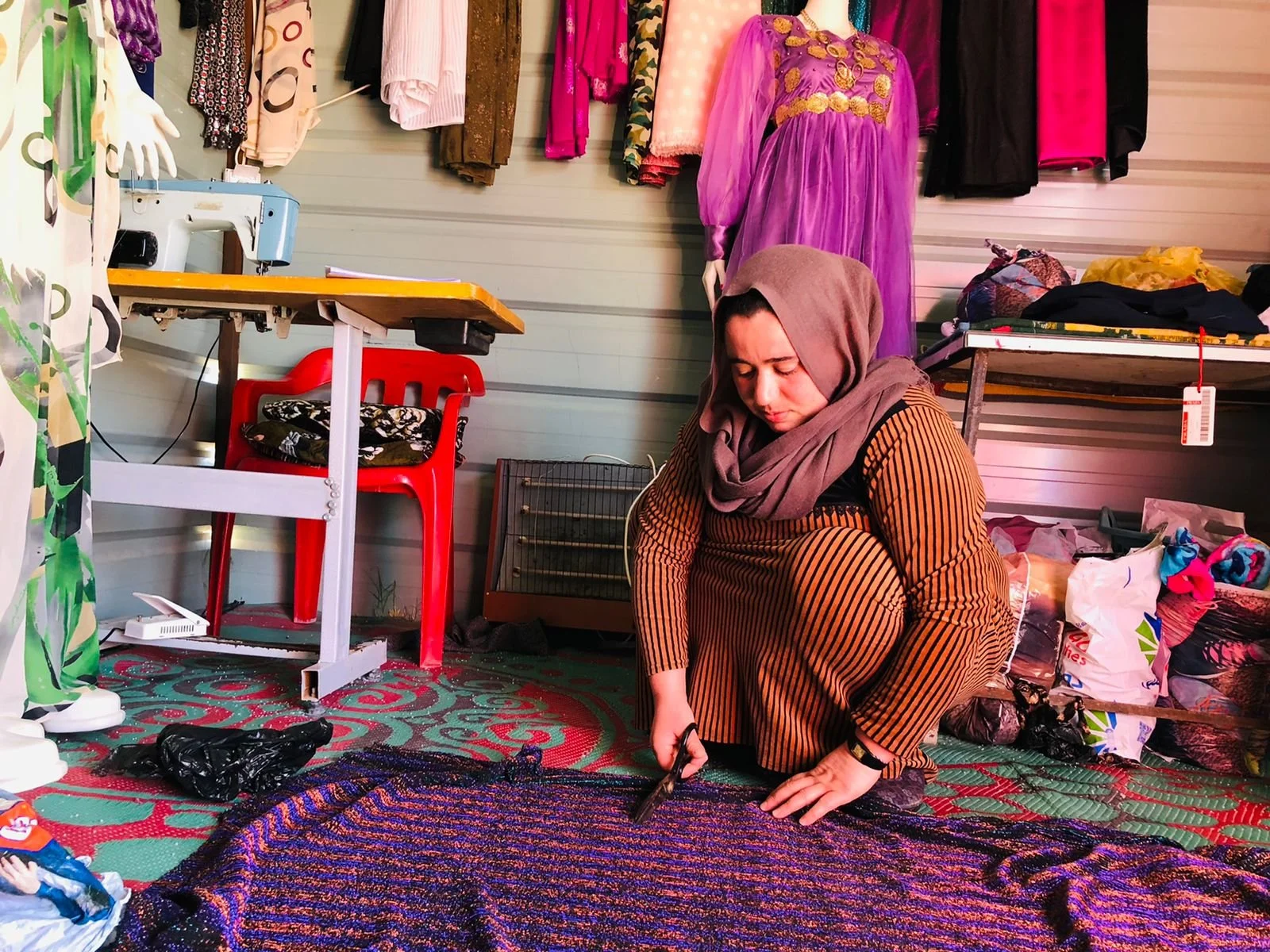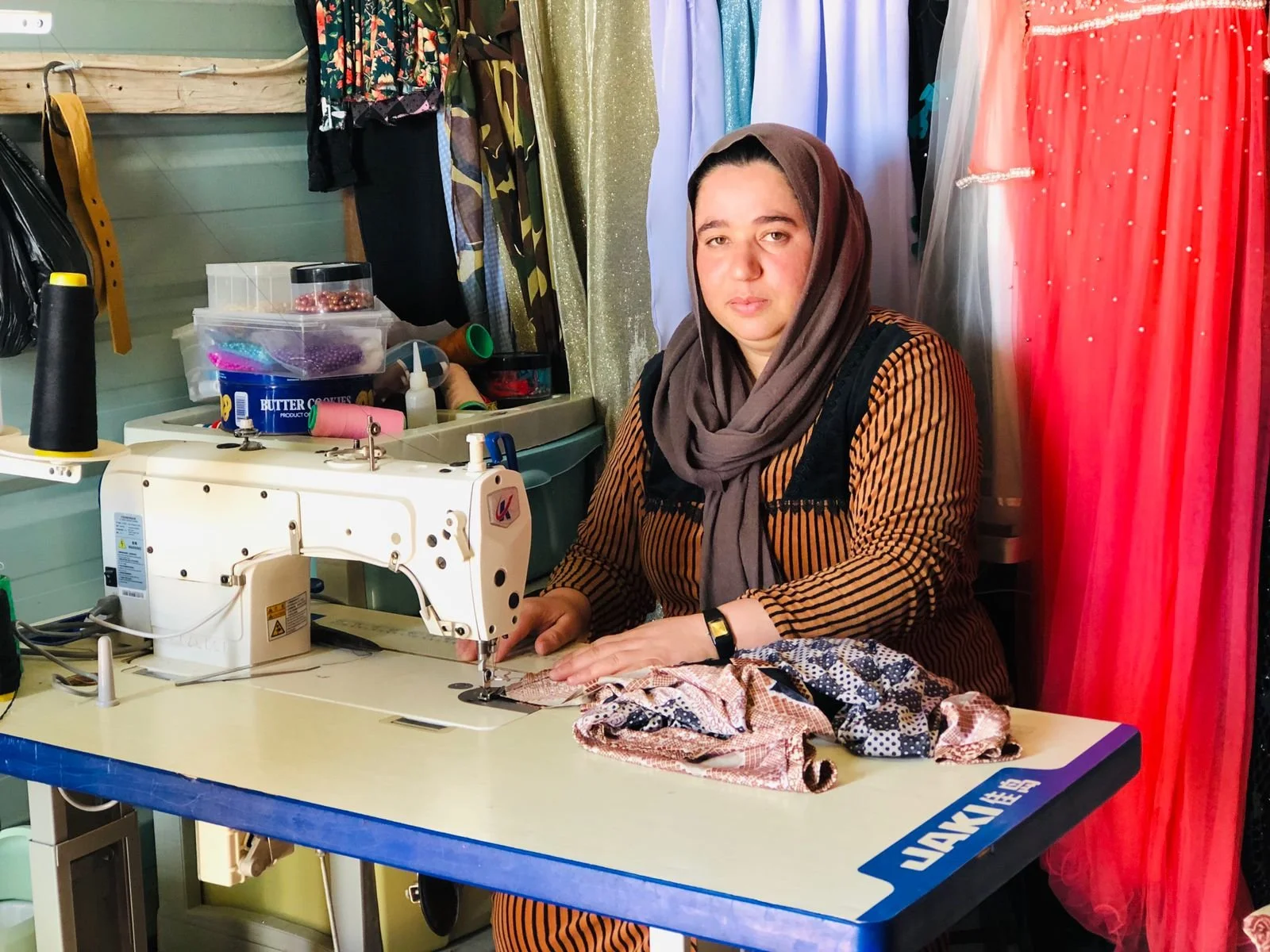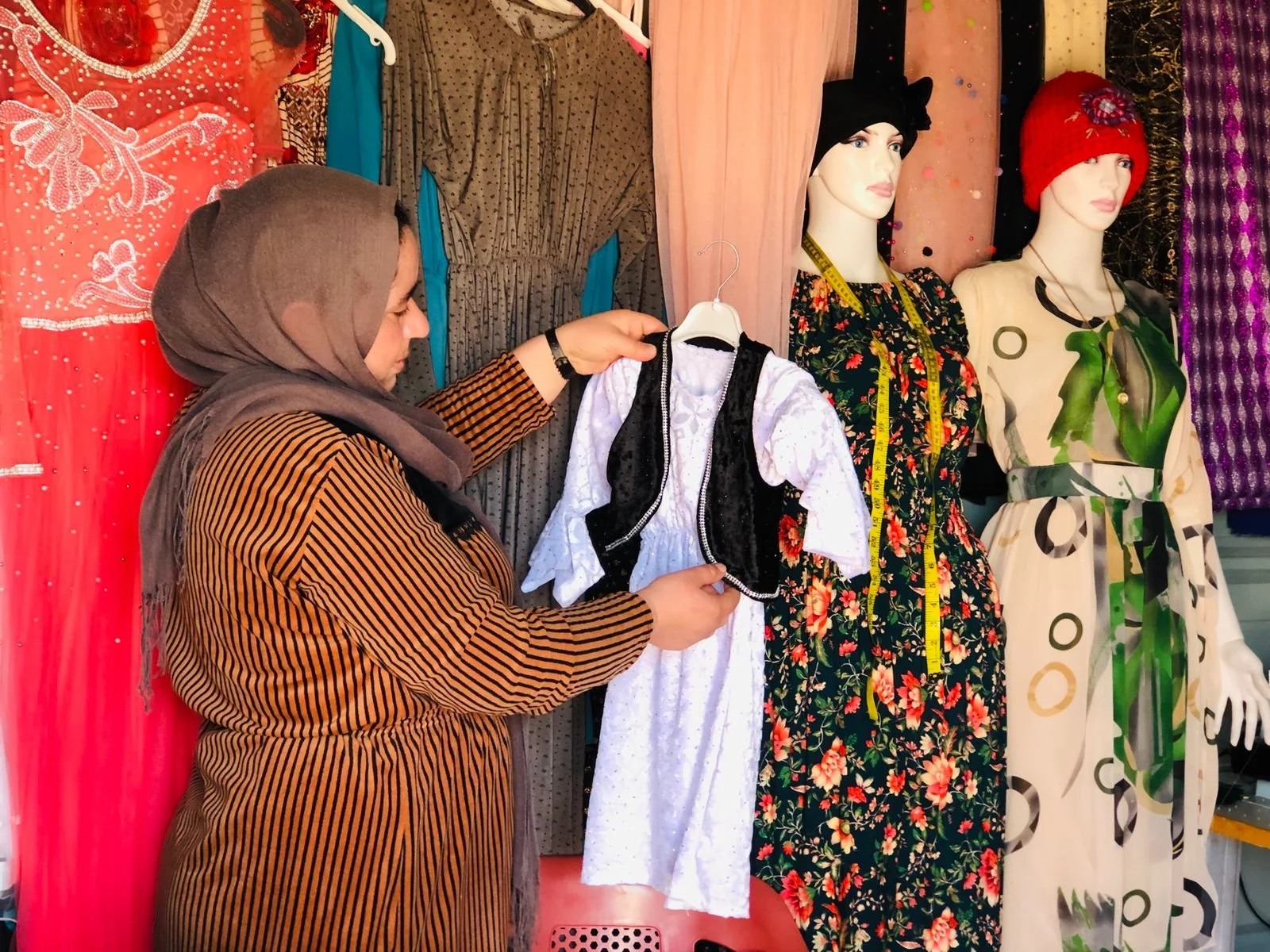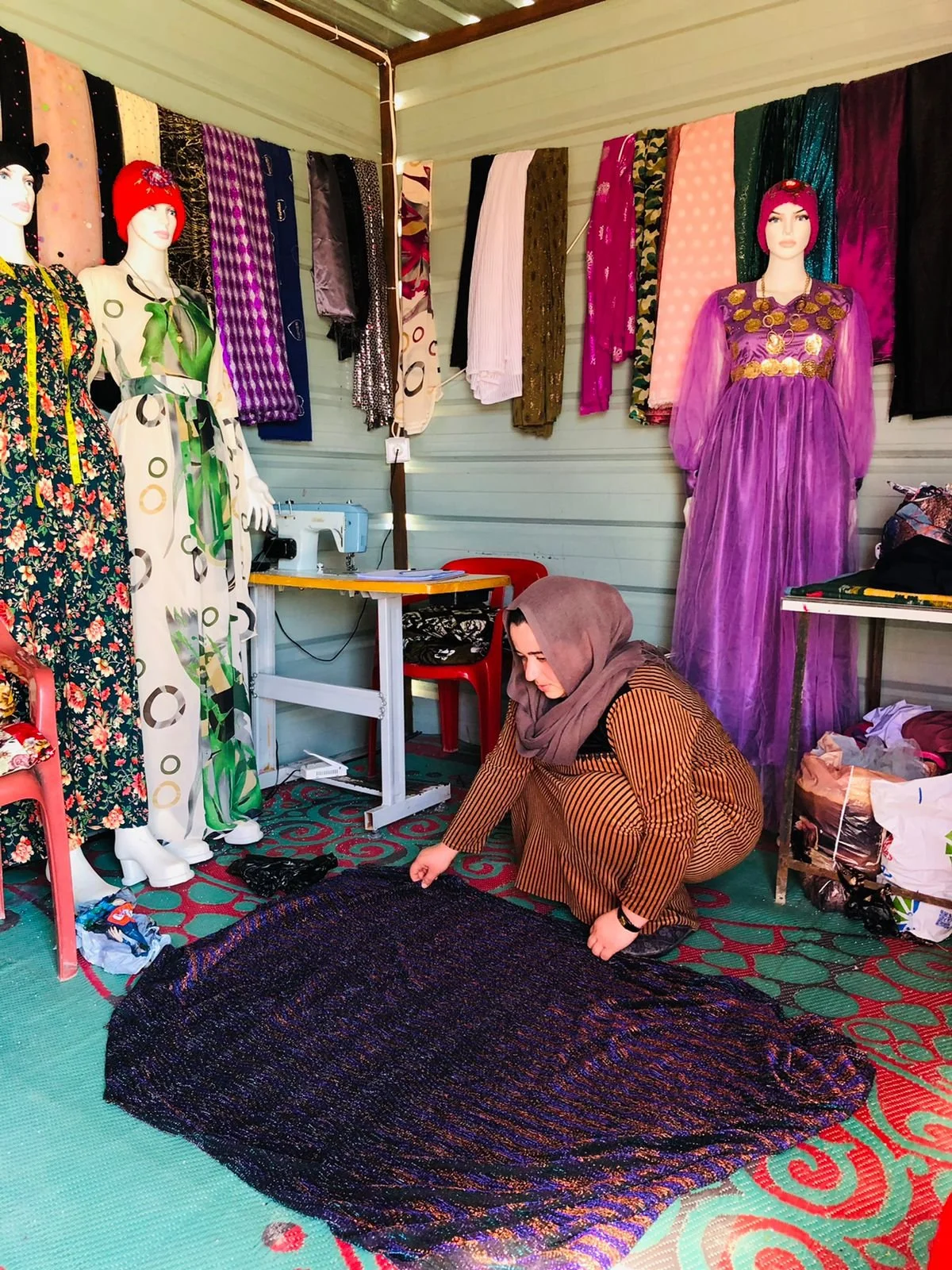Sisters’ Stories: “ISIS took our town and everything we had”
This is Kheriya, one of the young women who has experienced the benefits of our English language classes first-hand.
Originally from Sinjar, she was just a young girl living an ordinary and happy life until the conflict of 2014 turned her world upside down. “Before displacement I was a child in a safe environment with my family,” she says.
“I would play with my friends and have fun as a kid. When ISIS invaded, they took our town and everything we had. They took everything beautiful that we used to have.”
Since then, Kheriya has lived at Essyan camp with her family, and she has of course found the intervening years extremely tough. “Life here at the camp is barely manageable, but it is still better than returning to my unsafe town,” she stresses.
Although she always wanted to learn English and learn new skills, such opportunities remained out of reach – until she heard about the Lotus Flower’s projects.
Keen to find out more, she began attending classes at our Essyan centre, and adds: “I learned basic English language, and would pay so much attention to the teacher, taking notes on everything she gave.”
Kheriya now wants others to have the chance to take part in our educational activities, saying: “They can help you develop your skills and teach you reading and writing. Everything about the Lotus Flower is awesome, from teachers to the whole environment at the centre.
“I’m not the only one who liked the progress I achieved; my family were happy too that I got the chance to learn new things, and all I wish for in the future is inner peace.”
While we’re really happy that we’ve helped Kheriya in this way, there are so many more girls and women like her that we want to reach, and that means we need help from you – our supporters. Please do donate or get involved with our work in other ways if you can, because as Kheriya’s experience shows, when we work together we can genuinely change lives…
Support our education classes
Sisters' Stories: "I set fire to myself"
As you know, we think it’s fundamentally important to share the personal stories of women and girls we support, so you can see for yourself the kind of impact we’re able to have on their lives.
As such stories go, Nisreen’s is one of the most affecting we can remember - and we should warn you of references to suicide in what follows below.
An ISIS survivor who has lived at Essyan camp since the ISIS atrocities, 2014 saw Nisreen and her family forced to flee their home and seek safety on Mount Sinjar. “We lived in fear, hunger and thirst, as well as seeing people dying in front of us,” she recalls.
After seven days, they crossed the Syrian border into Kurdistan, and so began life in the camp. Unable to attend school because she was considered too old, Nisreen adds: “I spent most of my time inside the small tent, continuing to live the horror of days I spent on Mount Sinjar.”
Gradually, she found her mental health becoming so poor that she began having suicidal thoughts. “One morning, I woke early, and feelings of hopelessness, anxiety and depression took over me. In that moment, I thought it might be best to put an end to them. I went outside, took some oil and set fire to myself without even thinking twice. I won’t ever forget the moment when I screamed and my family and neighbours rushed to put out the flames on my body.”
After two months in hospital, Nisreen returned to camp and agreed to meet our psychologist. “Now, it’s been almost a year, and I love my therapist so much,” she says. “I’ve finally been able to speak to someone who can really help me. My hope now is to recover from my injuries, because around 50% of my body is burnt.
“It is painful, and I do feel ashamed to show my scars. But I hope that others like me in displacement can receive proper psychological support, because it’s a lifesaving service. I can’t imagine my life without it.”
With mental health needs increasing at an alarming rate, we really need to increase this kind of therapy next year – so please do keep supporting us…
support our mental health work
Can you help us reach more girls like Nisreen?
Sisters’ Stories: “Boxing made me feel better"
Zhiyan is a teenager from Sinjar who has been living at Essyan camp since the conflict in the region.
As a young girl whose whole life has been set against the backdrop of conflict, she says: “Our life was very different before displacement. We felt safe and secure, but now at the camp I have concerns about the future and how life can go back to what is was. We do not know how long we will be here.”
Just like so many other young people in camps, Zhiyan’s mental health has suffered badly over the years, and so she decided to sign up for the Lotus Flower’s boxing programme. “I always wanted to box, and before joining the classes I did not feel good. But boxing made me feel better and gave me comfort. My body also feels more relaxed now.”
Zhiyan is one of the participants of our project with Medica Mondiale, the women’s rights and aid organisation. Over the past few months we have been providing our Boxing Sisters training and self-defence for girls, along with literacy classes and awareness sessions on gender-based violence for women of all ages.
The project at Essyan is designed to improve vulnerable girls’ mental and physical health and to help them heal from years of trauma and upheaval. We also aim for the literacy classes to improve their educational development and employability, while the sessions provide a safe and welcoming environment where women and girls can bond and learn together. In addition, up to 320 family members have also been attending awareness sessions on key topics.
Speaking of the benefits she has personally experienced, Zhiyan adds: “My behaviour has changed towards my family since I joined the classes, and I have learned many new skills. I hope others can get the chance to join and develop their skills too. My hopes for the future are peace and safety for all.”
Our Boxing Sisters project has become one of our most popular programmes over the past few years, and we would love to keep on growing it – so do support us if you can!
can you Help Girls heal?
Even a small amount can make a big difference…
Sisters' Stories: ‘It was my dream to read books and write letters'
Shukriya is a 50-year-old Syrian refugee whose husband sadly passed away several years ago following an accident at work. As a single mother of two, she found life became harder and harder, especially as the conflict in her home country intensified. “The forces began attacking protesters and killing people, and then the government began forcing men and boys to join up. That’s when I decided to leave the country. I couldn’t put my son’s life in danger, as he and my daughter were all I had.”
After fleeing, life in a Kurdistan refugee camp was just as hard. “All three of us were suffering from loneliness and anxiety,” Shukriya adds. “We never left our house, and didn’t notice we were actually getting sick.”
One day, she heard her neighbours talking about the Lotus Flower’s projects. “They said the training and courses had helped them forget what had happened to them and added a little colour to their lives. So I decided to give it a shot myself. I knew I could stand on my two feet again, but I needed help to do so.”
Shukriya enrolled in our awareness sessions which she says “helped me a lot,” as well as Arabic lessons. “I knew how to speak Arabic but I could read nor write, and it was one of my biggest dreams to do so,” she says. “I wanted to be able to read books to write letters and so on - and I reached my goal at the age of 50.”
She has been attending various courses for three years now, and adds: “I will continue to do so because I love improving myself and I love the things I learn. My thanks go to the Lotus Flower for their hard work with us.”
As you can imagine, it gives us such great joy to see women like Shukriya achieve their ambitions while also beginning to heal and rebuild their lives…
Help us reach more women like Shukriya
It costs so little to support our women and girls’ literacy classes…
Sisters’ Stories: "I can now stand for myself as a woman and be proud of who I am"
Nuha is a 40-year-old refugee who fled from Syria two years ago and moved to Duhok city.
As a single mother of two children, she found she often felt overwhelmed and unsure where to turn for support. “I’d sometimes feel so lonely and depressed,” Nuha says. “I felt like I was goalless, and there were no opportunities to learn something new.”
A few months ago, she applied to join our Peace Sisters & Brothers project, which is training 50 women and men to become peace mediators in their own communities.
Funded by Deutsche Gesellschaft für Internationale Zusammenarbeit (GIZ) GmbH on behalf of the German Government, the project is designed to help restore harmony within fractured communities, focusing on conflict resolution techniques, women empowerment, cooperation and integration, plus confidence-building techniques. Participants come from different religious and ethnic backgrounds, including Yazidi, Christian and Muslim.
A Christian herself, Nuha has found the experience to be incredibly positive so far. “I’ve been delighted by the effect of this training on my personal life,” she says. “The mediation training helped me improve my skills and mental health, as well as my communication skills and Kurdish language. I’ve also met many warm-hearted people and made new friends.”
Nuha adds: “As a divorced woman, I felt left out, and like society has forced rules on me, or that I have disappointed people – when maybe it wasn’t even my fault. I decided to join the project as I wanted to learn how to be a mediator and to solve problems. Most importantly I want to show the world that the cause of a problem is not always a woman. I have been blamed for my, my previous husband’s and my children’s mistakes. I want to show them that just like women, men also make mistakes.”
The project will continue until the end of this year, and Nuha continues: “I feel I can now stand for myself as a woman and be proud of who I am. I am strong and independent and most importantly, I now know how to prevent my kids from arguing, and how to be a better mother for them.
“I totally believe that this project improves integration and strengthens social cohesion among communities. I’ve learnt that there is light at the of the tunnel – if we have desire to change. I also came to the conclusion that a woman who is OK with being alone is a powerful woman.
“I want to thank everyone who supports us, and tries to provide us with better lives.”
We’re so glad to be able to reach women like Nuha on this project, and hope it’s just the very beginning…
Support our peacebuilding work
Can you help us provide more life-changing opportunities to women like Nuha?
Mental Health Awareness Month: How Loza overcame social anxiety
October is Mental Health Awareness Month, and as always, we’re working hard to support the psychological wellbeing of hundreds of displaced women, girls, men and boys.
One of those we’re happy to have been able to reach in recent months is Loza, a young Yazidi who is originally from Sinjar. She has been living with her family at Essyan camp ever since ISIS attacked their village in 2014 and they had to flee to the mountain for safety.
Being forced into displacement has understandably had very negative impacts on Loza’s mental health, and she says: “Before I came to the camp I would spend all my time in the house helping my mother. I had social anxiety, and was very shy and scared to communicate and make friends.”
But since taking part in the Lotus Flower’s Youth Suicide Prevention project, which is supported by the German Consulate in Erbil, she has found her outlook on life has changed for the better.
“After joining the project and participating in the activities, my mental wellbeing has improved and I feel a lot better. I have been spending my time coming to the centre to participate in training, then I go home in the afternoon to help my mother and study all the things I’ve been taught to improve my skills.
“I have become aware of the signs of mental health issues, including recognising them and learning how to deal with them in daily life. Overall, I have become more optimistic, and happier.”
Project activities have include art and music therapy, as well as yoga and mental health counselling.
Having also had the chance to learn English through the programme, Loza adds: “It's beneficial for young people to join such projects, because they will gain more knowledge, become more social, make new friends – and have fun. These types of projects can contribute to youths’ mental health wellbeing positively, and they are very important for us to improve our thoughts and understanding. We enjoy our time together.”
Loza now aims to become fluent in English, and to improve her computer and software skills – and we’ll be right behind her as she pursues her ambitions!
Support our mental health work
We badly need funding to reach more traumatised youths and conflict survivors. Can you support us?
Sisters’ Stories: How Abeer’s mental health has improved
Abeer is a teenager from Syria who became a refugee back in 2013, when she was just a young child.
The long-running war means she has lived in a small tent at Domiz 2 refugee camp with her six siblings and father for around 10 years, and so most of her memories are of living in displacement.
Always keen to learn, Abeer heard about our project with The Big Heart Foundation and NAMA, which is providing mental health support and awareness of gender-based violence, as well as financial support and business mentorship for new and existing women-led small businesses.
She decided to take part in our mental health counselling, as well as awareness-raising sessions and seminars, which have focused on topics around gender-based violence and abuse, early marriage and women’s rights.
Now Abeer says: “I wanted to participate in this project because I felt down mentally, and I wanted to feel better. I joined group sessions offered by the psychologist, and I encourage people of my age to be part of this because it can help you understand your feelings and how to deal with the problems we face as women and girls in refugee camps.”
In the project, our mental health sessions have covered multiple topics, including anxiety, depression, suicidal thoughts, self-care, art therapy and PTSD. Earlier in the year, we also ran a campaign to raise awareness of bullying, which came about after we received feedback from project participants that such harmful behaviour has increased inside camps, especially toward women and girls.
Another part of the program has seen a group of selected women take part in business management training, while they will also receive small grants to start businesses of their own choosing. During the training, business specialists concentrated on enhancing their skills in online marketing, financial management and networking.
Additionally, we have this year provided financial support to 10 existing women-led businesses in Rwanga and Essyan camps, which had suffered due to economic hardship caused by the pandemic. This has allowed them to restart their businesses and purchase new stock and essential items needed to get back on track.
We’re so glad the project is having such positive impacts right across the board…
Sisters’ Stories: ‘I can see I am improving every day’
It’s often hard to imagine what some of the women and girls we support have been through – and Belar* is no exception.
A Yazidi woman aged 18 who is originally from Sinjar, she came under ISIS control as a young girl following the devastating attacks of 2014. Horrifically, she suffered many forms of violence before eventually escaping her tormentors and finding safety at Rwanga IDP camp.
Inevitably, the ordeal severely impacted on Belar’s mental health, and she has struggled to come to terms with it for years. As well as continuing her education and working to provide for her family, Belar recently signed up to our Youth Suicide Prevention project, which supports young survivors impacted by the conflict.
The project – in partnership with the German Consulate in Erbil – was designed in response to rising mental health issues in IDP and refugee communities as a result of the pandemic. Following repeated lockdowns and increased economic uncertainty, many youths have been struggling with conditions such as depression and anxiety, especially with extra pressures on already limited resources. Through the intervention, our team offer psychological counselling for participants and their families, as well as art therapy, music, yoga and English language classes.
“I especially love the yoga classes, and I can see I am improving day by day,” says Belar. “These activities also help us change our thoughts and avoid thinking negatively. I have had suicidal thoughts before, but with the Lotus Flower’s support I’ve been able to rejoin the community and get that idea out of my mind.”
Recently, the first group to complete the Youth Suicide Prevention project celebrated their achievements with an inspiring graduation ceremony, which saw them receive certificates and sing and dance together.
We’re so please at how this program has been going so far, and will be bringing you many more updates as it continues…
* Belar’s name has been changed to protect her identity
Sisters' Stories: How baking transformed these women's lives
Our Baking Sisters programme is one of our core income-generating schemes, and sees many of the women we support running their own successful camp-based bakery and coffee shop, plus a social enterprise.
With so many life events happening in camps, there’s always huge demand for cakes and bakes to celebrate birthdays, graduations, anniversaries and religious and traditional occasions. Women and girls also love to meet up to share a homemade treat and talk freely in our dedicated cafe space.
Baking Sisters started as a small project, utilising the talents of a few skilled bakers, but has since developed into a long-term project which has moved into a more extensive community space. The scheme not only equips women with the skills to cook, but also fosters friendships, healing and community spirit, while simultaneously building their confidence.
Crucially, Baking Sisters is managed and operated by the women themselves – with the initial equipment, structures, capital goods and raw ingredients provided by the Lotus Flower.
Here you can see some of the women’s own stories and verdicts on the project - which we’re so proud of!
Sisters' Stories: How our project with The Big Heart Foundation and NAMA is helping ISIS survivor Asima
Since launching in December, our project with The Big Heart Foundation and NAMA Women Advancement has been making great strides, with many women and girls experiencing significant benefits to their lives.
The year-long Women’s Business Incubation initiative is providing financial support and business mentorship for new and existing women-led small businesses, as well as mental health support. The project is also delivering large-scale community awareness sessions to help reduce and prevent gender-based violence.
One of the beneficiaries of the project is Asima, a 19-year-old living at Essyan camp with her four siblings and mother, after her father passed away 10 years ago. Like thousands of other Yazidis, she and her family experienced extreme hardship during the ISIS attacks of 2014, and after being forced to flee their home, they became being stuck on Mount Sinjar for five days, with no food or water. Asima has never had the chance to attend school, and has instead been responsible for taking care of her younger siblings.
Asima is just one beneficiary of many
But after recently participating in our project, receiving mental health therapy and taking part in a range of awareness activities, she says: “I used to be alone in our tent with nothing to do, so I wanted to socialise more and try new things.
“I have learned a lot from the mental health sessions, and am feeling calmer and better after getting to know girls from the camp.”
Using techniques taught by our psychologist, Asima is now able to manage her anxiety and negative emotions. “I continuously practice the things we’ve learned in the sessions, and it has made me feel more joyful, and less alone.”
The Women’s Business Incubation project is being run at Essyan, Rwanga and Domiz 2 camps, with 10 women also receiving financial grants and mentorship in order to launch a new small business. Their training covers the fundamentals needed to start a business, from market research and planning through to launch, effective management, recruitment and networking. In addition, a further 10 women whose businesses have been badly impacted by the pandemic are recieving financial grants and mentoring so that they can refresh and relaunch their businesses, with a focus on digital and online marketing, social media for business, crisis management, hygiene training and delivery services.
We’re so grateful to The Big Heart Foundation and NAMA for their support and for enabling us to reach so many displaced women and girls in this way…
Sisters' Stories: 'Before taking literacy classes I felt like I couldn't see'
We hope you enjoy reading our regular Sisters’ Stories, which are all about the women and girls we support from week to week.
This week, we’re introducing you to Aliya, who is another of the beneficiaries of our literacy program. She is 24 and has lived at Rwanga camp for displaced people ever since 2014 when ISIS attacked her city. “Men were being killed and women were being taken into slavery, so we had to flee to the Kurdistan region,” she recalls.
Aliya and her family understandably found adjusting to life in the camp very tough, and because she had been deprived of her own education, she could not read or write either. “This made me feel like someone who could not see,” she adds.
Eventually, she started taking the Lotus Flower’s literacy classes, which means she not only has new skills in reading and writing, but she can also teach her own children. “The classes were very useful for me, and because I can now help myself and my family, it has improved my mental health and helped me stop overthinking things.”
She is far from alone in experiencing these benefits, and so many of the women and girls who take our literacy classes say it improves their psychological wellbeing, as well as increasing their confidence, self-belief and inter-personal skills.
Literacy is one of our core projects, which runs alongside English language classes. During the three-month course, participants develop an understanding of the alphabet, how to write letters and numbers, and soon they are able to construct simple sentences. Classes also include discussion and awareness of key topics around women’s rights.
Since increased literacy is known to boost women’s social and economic chances and accordingly reduce poverty, we’re sure you understand why offering these classes is - and will remain - one of our biggest priorities…
Sisters’ Stories: ‘Mediation can be the ultimate solution to conflict’ – Peace Sister Mariam
A new round of our Peace Sisters project is well underway now, with 50 women and girls currently taking part in training in mediation and conflict resolution.
The project is supported by Cordaid’s Women Voices First programme and UK in Iraq, and is reaching women and girls in out-of-camp locations within Zakho and Al-Hamdaniya communities.
So far, the training has included two-day workshops on the UN’s landmark Resolution 1325 on women, peace and security, which recognises the disproportionate and unique impact of conflict on women and girls.
One of the participants is 20-year-old Mariam, a student who lives in Zakho. She says: “The project really got my attention and when I was informed that I had been accepted, I was very happy!”
Mariam says she has already learned a great deal during the sessions, adding: “I’ve learned that the solution for conflict is not force or creating more conflict – mediation can be the ultimate solution. I am also now more open to accepting different opinions, new faces and the new world we live in. Now I understand that we as women are capable of anything, any time.
“In our communities, women are mainly housewives and mothers, and most don’t have many opportunities to participate in activities. For me this is totally wrong, as I strongly believe that women are talented and can do so much more. Skills like mediation and conflict resolution can offer women a brighter future.”
Mariam is enjoying the project so far
This current iteration of our Peace Sisters project is especially significant as it is focusing on the outside-camp locations of Zakho and Al Hamdaniya. This matters because a recent needs overview from the UN Office for the Coordination of Humanitarian Affairs (UNOCHA) stated that displaced people outside camps are most vulnerable.
As well as training in mediation and conflict resolution, the project promotes women’s participation in leadership and decision-making to enhance peacebuilding and social cohesion, and also covers human rights awareness and the prevention of gender-based violence. Additionally, the Peace Sisters will receive training in critical thinking, leadership and advocacy, and they will lead workshops to bring together women activists and local leaders. When the training concludes, the Sisters will then select their own community initiatives to be implemented, with our support.
Sisters' Stories: How sport helped ISIS survivor Bare's mental health
It’s a well-known fact that sport and exercise are great for improving mental health - which is why we regularly provide fitness classes for women of all ages.
Previously, those we support have had little chance to attend such sessions, and have even been urged not to exercise in public, as to do so has traditionally been seen as indecent. Understandably, many women still fear that taking part in any fitness activities could leave them exposed to ostracisation and local backlash - another example of the way their basic rights have been eroded for generations.
One of the women who has found our sports classes hugely beneficial is Bare, a 34-year-old who has been living at Rwanga camp since fleeing the ISIS attacks.
She says: “Before being involved in the Lotus Flower’s sports classes, I used to be depressed and have unstable mental health. Taking part in the training at the women’s centre has helped me with my mental health, and I am really grateful to the team for this.”
As well as providing gentle keep-fit classes for women of all ages and abilities, we run yoga classes too, plus our phenomenally popular Boxing Sisters programme. Not only are these sorts of sessions good for boosting mental health, but they also provide a chance for women and girls to meet in a safe space and form friendships.
According to Sport England, these are the main effects of physical activity on mental health:
Improved mood
Research has found that people feel more awake, calmer and more content after physical activity.Reduced stress
Research has shown that active people tend to have lower stress rates compared to those who are less active.Higher self-esteem
How we feel about ourselves and our perceived self-worth improve when we exercise.Lower rates of depression and anxiety
Exercise has been described as a “wonder drug” for preventing and managing mental health issues.
Sisters' Stories: Photography helps Dilveen tackle mental health issues
Our popular Storytelling Sisters project provides girls with a combination of photography and creative writing skills, enabling them to share their experiences through imagery and words.
Dilveen is a 19-year-old conflict survivor who lives at Essyan camp after fleeing the ISIS attacks of 2014, and she is just one of those who have found huge personal benefits from the project. She says: “I like being part of the photography training classes at the Lotus Flower centre, because they build my skills in taking professional photos and telling stories of people through them.”
After her traumatic experiences of the war - which saw Dilveen and her family forced to leave their home - she suffered from mental health issues which left her feeling alone and unable to make new friends. “The classes have helped me socialise more with others inside the camp, which comes after I was isolated due to psychological issues.”
She adds: “The training here is so useful to me, and I hope there will be more opportunities like this for me and other young girls in the camp.”
As part of the programme, women and girls learn how to use DLSR cameras and photo editing software, plus how to create video content and use social media platforms to share their work. The scheme serves as a creative outlet which helps women and girls process their emotions after years of conflict, as well as the harsh realities of being displaced.
Storytelling Sisters also aims to offer the participants highly transferable skills which will prove useful in securing future employment, while others have gone on to obtain a job as professional trainer within the Lotus Flower itself.
Please do support our work so that we can continue to provide these valuable opportunities for women and girls…
Sisters’ Stories: How English classes have inspired Aveen
Our English language project has been running since 2017, and remains one of our most popular programmes to date. With beginner and intermediate-level classes for women and girls, each course is informative but also fun, and lasts from one to three months.
As the world’s most common language, we believe being able to communicate in English gives participants the best chance of embarking on their own career and achieving financial independence. Running alongside girls’ studies at school, our classes also complement their learning, significantly improving their skillset and wider knowledge.
Aveen is one teenager to have benefitted from our programme, which she began in February 2022. As a young Syrian refugee who came to Domiz 2 camp with her family in 2018, Aveen had searched in vain for a long time to find a place where she could learn English. “Now with the support from the Lotus Flower, my English is becoming noticeably better. The classes help me become better at school, because when we have a school exam, our teacher here at the centre practices with us, which makes a big difference in my language level and school marks.”
She adds: “I also like the awareness sessions we take after our classes because they focus on things that are important in my life.”
Aveen has found learning English extremely helpful to her school progression
Providing an immersive learning environment, our English courses introduce a range of vocabulary and expressions which are essential for every-day life, as well as grammar and other principles of the language. The classes also develop students' verbal skills – including reading out loud, discussion and debate – and help promote their understanding of and appreciation for books and writing. Vitally, we create a safe and flexible classroom environment, which is conducive to optimal student learning, and which encourages the students to work independently and collaboratively in groups.
At the end of the course, each participant receives a certificate, and it's always a joy to see how students have flourished and grown by the end…
Sisters’ Stories: Surian’s healing journey with the Lotus Flower
This week, we wanted to share the story of Surian, a beneficiary from one of our latest projects, which is providing much-needed women’s livelihoods, awareness and mental health support.
Surian is aged 20, and has been living within Essyan camp since 2014 after fleeing the ISIS attacks with her family when she was just a young teenager.
Adjusting to life in camp after the huge trauma of war has of course been difficult over the years. And like so many young women, Surian has often felt like she had nowhere to turn for emotional support. When she heard about the Lotus Flower’s women’s centres she signed up for various different training courses and classes – including our latest project.
She says: “I have been attending awareness sessions on gender-based violence and group psychosocial sessions at the centre. I decided to take part in these activities because I had anger issues, and always felt down. I knew I needed to see a psychologist, and also wanted to make friends with other women. With the group therapy sessions and gender-based violence awareness, I am feeling calmer now – especially when I practice the activities from the sessions.”
She has also found her understanding of key issues affecting women has also increased. “I know more about my rights, and my obligations as a female to reduce gender-based violence against other women within my community,” she says.
Surian is one of many women and girls to benefit from these sessions, which are part of our collaboration with The Big Heart Foundation and NAMA. With escalating mental health issues and a sharp rise in gender-based violence and exploitation in refugee and IDP settings, the project includes awareness sessions plus psycho-social support with a professional psychologist.
The year-long project is also providing financial support and business mentorship for new and existing women-led small businesses. Priority for this element of the project is being given to female heads of household, widows with children and ISIS survivors.
We’re so pleased our projects are making a difference to women like Surian, who so richly deserve these chances in life…
Sisters' Stories: Widow Fatima finds healing in language classes
There are still so many women and girls affected by the Syrian conflict, almost a decade after they were first forced to flee their homes and loved ones.
We work with many survivors at Domiz 2 camp, one of the biggest camps for Syrian refugees which opened in 2013. We’re always incredibly inspired by the number of women who are willing to throw themselves into new experiences – despite having lost so much in their lives.
One such woman is Fatima, who is originally from Qamishlo in Syria. Now 56 years old, she is a widow who was bereft when her grown-up children married and moved away. “I was left alone in the camp, and was so lonely,” she says. “Due to anxiety, stress and depressive thoughts, I decided to visit the Lotus Flower centre, where I knew the manager.”
That was in 2019, and Fatima has been attending awareness sessions on a variety of topics at the centre since then. “These gatherings help me get rid of negative energy, and I am always happy to attend because the centre has such a kind and supportive team.”
Our awareness sessions cover all kinds of issues, from gender-based violence and exploitation to women’s rights and peacebuilding, as well as various physical and mental health topics.
Showing that it’s never too late to start learning, Fatima recently also signed up to our adult language classes. “I have been participating with my friend, and am very happy to be able to study Arabic and English,” she adds. “I feel good that I am going out to do these things.”
While life is still not easy for Fatima, we’re so pleased we can support her and other women in the same situation, so that they can finally start to put the pain of the past behind them…
Sisters' Stories: Shaima’s shop helps her provide for her children
As you may be aware, our Women’s Business Incubator livelihoods training programme has just won a major innovation award from UNHCR.
Our project provides business training, mentorship and start-up grants so that women can start small businesses of their own choosing, and earn a sustainable income to support themselves and their families.
We’re thrilled to have received the award, so thought we’d tell you about another of the women we support who has started her own successful business thanks to the programme.
Shaima is 32, and a single mother of three children. Things have been hard for her since she first arrived at the Rwanga camp seven years ago, and she says: “Life has been very harsh for me and my kids in the camp – especially when we lost my husband. I’ve often struggled to provide the food that my children need.”
In 2019 Shaima was selected to take part in our business training programme, and received a grant so she could launch her own business. She chose to open a shop that sells all kinds of clothing, underwear, accessories and hair and beauty products.
“It helped me hugely in sourcing my own income,” she says. “It was an exceptional experience and gave me the opportunity to be empowered, and to provide what my family most need. Now I don't have to depend on anyone else, and women really like to come to my shop. They are more comfortable to purchase items from me than other shops.”
However, it has not all been plain-sailing for Shaima, and in 2020 the pandemic forced the closure of her shop for two months, which meant her income suddenly dried up and she struggled to provide for her children once again. But when things were safe enough to do so, the Lotus Flower stepped in to provide further support and training so that she could restart her business, and she is once again welcoming customers to her store. “It has been incredible,” she says.
After all she has been through, we’re so happy to have been able to support Shaima and her family, and to enable her to start rebuilding her life after years of unimaginable trauma. With your support, we hope to expand our business training and grants much further, so that many more women can receive the same opportunity...
Sisters' Stories: Support women like Amira this #IWD
As you may be aware, for this International Women’s Day, we’ve teamed up with brilliant artist Raz Xaidan, known as the @thedarlingbeast, to bring you an exclusive print that will help fund our vital literacy work with women and girls.
The artwork is called ‘Rise’, and celebrates the empowerment of women and girls through reading and writing. Each £20 donation provides you with a high-quality digital download of the print, while funding three months of our literacy classes for a female conflict survivor. Your donations will go towards providing a literacy trainer, plus stationery, curriculum books and refreshments.
If you need any more reason to get involved, let us tell you about Amira, a 27-year-old conflict survivor from Sinjar. She now lives in Rwanga camp for displaced people, and has never had the chance to go to school or learn due to acute poverty and her mother’s longterm illness.
“I always dreamed of being able to attend school and become educated,” says Amira. “So when I found out that the Lotus Flower provides opportunities to help women learn to read and write, I decided to find out more. I was thrilled to see that one of their activities was literacy classes, and in the beginning of 2021, I joined up and still continue today.”
She adds: “I have learned a lot and can now confidently read and write letters and sentences. This really helps me be more aware of what's going on in the world, and I enjoy meeting other women and girls who have also always been illiterate. I hope I will be able to continue these classes, as one day I would also love to learn new languages with the help of the amazing teachers.”
With 100% of all monies raised being generously donated to the Lotus Flower by the Darling Beast, your support will make a real difference to women and gilrs like Amira. So please do support us this #IWD by clicking the link below….
Sisters' Stories: Naam’s tailoring shop prospers despite Covid struggles
There’s no denying that Covid-19 has had a critical impact on women’s livelihoods in Iraq. With the pandemic resulting in business closures and widespread loss of income, many women have been left with little or no way of supporting themselves and their families.
As part of our ‘Sisters’ Stories’ series, we turn our attention this week to one of our big focus areas - enabling women to start their own small businesses through grants and training. Despite difficult times, we’re delighted to have been able to support entrepreneur Naam in this way.
The 30-year-old mother, who lives at Essyan camp, took part in our business training initiative in 2020, and with the skills she learned decided to open a tailoring shop. “I have excellent skills and experience in this, but poverty meant I was never able to afford a sewing machine or the necessary equipment,” says Naam.
After completing our specialised training and receiving financial support, she was able to start her business. “It meant I could earn a very good income for myself and my children,” she says. “But when the pandemic began I was faced with difficulty in bringing in an income as I had far fewer customers than before. This impacted on my ability to source the fabric I needed for my shop. But once again, the Lotus Flower was there to support me, and provided me with all necessary equipment that I needed to restart my business.”
We have been working hard to enable many women-led businesses to start up again following the damaging effects of Covid-19, but much more support is still needed. With a large proportion of women having lost jobs due to lockdowns and restriction of movement, they also suffer from a general lack of economic opportunity, which impacts most heavily on those who are now head of household.
Our pioneering livelihoods programme empowers women to earn a sustainable income through their own skills, become financially independent and primary decision-makers within their families and communities. Since the pandemic struck, we have also made our project more resilient by focusing on business training that can withstand times of crisis or unforeseen disruption – such as digital and online marketing, social media, crisis management, hygiene training and delivery services.
As just one of many beneficiaries, Naam adds: “I am so grateful to the Lotus Flower and hope people continue to support the organisation so that more vulnerable women and girls in camps can receive this kind of support.”

